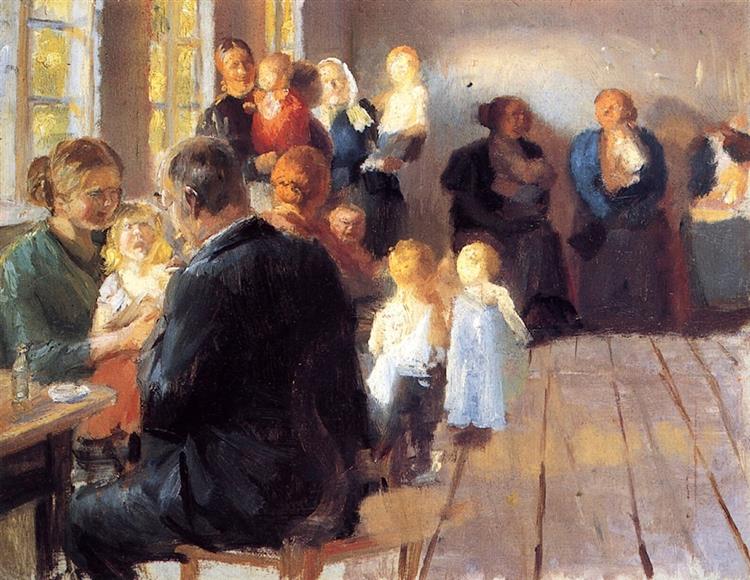Description
The work "Vaccination" of Anna Ancher, carried out around 1889, is presented as a notable example of the artist's unique approach to the portrait of everyday life, where humanity and intimacy of the social environment of her time are intertwined. Ancher, one of the most important figures of the Movement of Golden Age Danish and a prominent member of the Skagen circle, dedicated himself to exploring daily life and family relationships, focusing especially on the lives of women and children in their compositions.
In "Vaccination", Ancher captures an evocative moment that reflects both the concern for child health and the social context of his time. The paint shows a vaccination scene; Although the faces of all the characters are not appreciated in the image, several elements that suggest an atmosphere of concern and care can be observed, predominantly the figure of a child who, in his representation, seems to be under adult care. This aspect highlights the importance of the community in health care, and the protective gaze of adults towards the child figure is palpable.
The composition of the work is careful, with an approach to the relationship between the characters and their surroundings. Ancher opts for a disposition that guides the viewer's gaze towards the child, the focal point of the image, while the adult figures that surround it seem to convey attention and warmth. The characters are grouped so that they create a sense of unity and fragility, emphasizing the act of vaccination not only as a medical procedure, but as a community ritual.
The colors used in the work are subtle and harmonious, dominated by warm tones that evoke a cozy atmosphere. Earth and soft ranges contrast with the textures of the tissues and the skin of the characters, creating an attractive and sensitive visual effect. This color choice, a distinctive seal in Anchar's work, allows painting to breathe an emotional quality that resonates with the viewer, providing a sense of connection and empathy.
In addition, the use of light in "vaccination" is a testimony of Ancher's virtuosity. The soft and natural light floods the scene, suggesting a family and domestic atmosphere. The lighting contributes to accentuate the three -dimensionality of the figures, as well as to create a space that seems both intimate and open.
Although "vaccination" is not as well known as some of its most iconic pieces, it reflects Anna Annche's constant interest in social issues and child welfare. Through his art, Ancher contributed significantly to the dialogue on health and community in the context of the nineteenth century. His focus on the child's portrait in everyday situations makes him a reflection of contemporary concerns, where vaccination appeared as an advance in medicine and child protection.
Anna Ancher, in her work, not only captures a moment, but also provides a comment on the social regulations of her time, intertwining social reality with visual narrative. In "vaccination", its distinctive style, characterized by the use of color, light and an intimate composition, invites the viewer to contemplate not only represented, but the essence of the community and care in the process of life. It is undoubtedly a reminder of the valuable role of health at home and a tribute to the unwavering dedication of those who care for the most vulnerable.
KUADROS ©, a famous paint on your wall.
Hand-made oil painting reproductions, with the quality of professional artists and the distinctive seal of KUADROS ©.
Art reproduction service with satisfaction guarantee. If you are not completely satisfied with the replica of your painting, we refund your money 100%.

